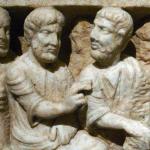
As the Christian faith is often presented as some sort of moralistic legalism, with God looking for any and every reason to damn us for eternity, we lose sight of what Christ was about, that is, the good news that God loves us and desires our salvation. We should not believe God is looking for any and every excuse to condemn us, using whatever extreme legalistic argument to justify our perdition; rather, our faith should have us know God loves us and wants nothing more than for us to experience that love. God’s love is always there for us. Even when we try to cut ourselves off from it, when we resist it, God is always working on our behalf. It is true, we can conventionally say that God hates sin, but we must understand the reason why: it is because sin causes us pain and sorrow, and so long as we hold ourselves to it, we cannot experience the beatitude God wants us to have. God’s love for us does not change, and so when we sin, it remains; no matter what we do, God continues to love us and will love us for all eternity. We are the ones who can and often do change, sometimes resisting that love and all that it offers, sometimes welcoming it, trying to do all that we can to properly engage it. The greatness of God’s love is revealed to us in Christ Jesus, the incarnate God-man. Jesus shows us that despite our sin, despite what we might have done, despite how much we resist God’s love, God will do all that is possible to save us, including becoming one of us, taking our abuse, and dying for us. When we sin, when we add to that abuse which the God-man suffers, that only gives Jesus even more opportunity to show how much greater God’s love is for us:
But God, who is rich in mercy, out of the great love with which he loved us, even when we were dead through our trespasses, made us alive together with Christ (by grace you have been saved), and raised us up with him, and made us sit with him in the heavenly places in Christ Jesus, that in the coming ages he might show the immeasurable riches of his grace in kindness toward us in Christ Jesus (Eph. 2:4-7 RSV).
Grace, given to us by God’s love, is fundamental to our salvation. Without it, we cannot be saved, which is it can be said that we are saved by grace, and not by works. We must not interpret this to mean that God does not desire us to change, to cooperate with the divine will. Rather, it means God is always at work, doing what needs to be doing to bring us to the point that we can and will cooperate with that will, to do so out of love and not just a sense of legalistic obligation. We can’t save ourselves, but we can resist God and God’s love, and so long as we do so, we resist grace and the healing which it brings to us in our lives.
God’s love is eternal, and what is revealed to us in Christ is that eternal love, a love which remains unchanging, a love which sets up the means by which we can be saved; without it, without the illumination and grace given by it, would will not be able to attain perfection, let alone transcend ourselves. Thus, the enlightening grace of God is the foundation for our salvation, and because of it, it can be said our salvation is of grace, not of works:
For by grace you have been saved through faith; and this is not your own doing, it is the gift of God — not because of works, lest any man should boast. For we are his workmanship, created in Christ Jesus for good works, which God prepared beforehand, that we should walk in them (Eph. 2:8-10 RSV).
Our creation and our recreation are done with grace, and through that grace, we are given the means we need to do the works we were created to do, works of love, works which unite us with God and so reveal the glory of God in all that we do. When we sin, we undermine that love, and find ourselves entering a cycle of spiritual corruption and death. We cannot overcome the cycle by ourselves. But when we open ourselves to God, when we accept and integrate God’s love in our lives, we will find ourselves reversing that cycle and coming out of until, until we are free from its pull and we find ourselves open to more and more grace, more and more of God’s love, becoming greater and greater the more receive of it. Our aim should be to join ourselves to a cycle of grace of love, where we find ourselves engaging more and more of it throughout all eternity.
It is important for us to realize that without grace, we will not be able to transcend ourselves, just as much as we must understand that with it, we still are expected to play our role, to do our part, that is to cooperate with it and live our lives doing as much good as we can. If we think we can let God do all the work, that we need to do nothing else but believe, we have completely misunderstood Paul, for Paul made it clear, we are saved by grace through faith, and faith is much more than mere belief, but about being faithful to what we believe. We are given grace for the sake of good works; we are meant to take in the grace offered to us, the love which is shown to us, and integrate it into ourselves so that, once we find ourselves freed from the prison which sin created for us, we can and will find ourselves doing the good which God desires us to do, the good which God knows makes things better, not just for others, but ourselves.
The more we open ourselves to God with love, the more we will find ourselves praising God, as we praise anyone who we love. Through that praise, we will reveal what it is we have apprehended of God’s glory, what, that is, which inspires us and makes us to love God. We will want to tell others what God has done, just as we tell others about the people and things which we love. We will, therefore, do what the man who was possessed by “Legion” was told to do (and did) after he was freed from his demonic possession:
The man from whom the demons had gone begged that he might be with him; but he sent him away, saying, “Return to your home, and declare how much God has done for you.” And he went away, proclaiming throughout the whole city how much Jesus had done for him (Lk. 8:38-39 RSV).
When we find ourselves returning to our home through grace, that is, when we find ourselves returning to what can be said to be our original “pure nature,” we will find ourselves free to embrace God with love. When we do that, we will find ourselves also embracing others, as we will embrace and love all that God has made and loves. We will embrace love, doing all we can out of love. We will praise God, finding it is the natural outcome of our love, and through that praise, we will find ourselves loving God more and more, as we will come to know God more and more. Indeed, by our love, we will find ourselves becoming participants in the divine life, the life of eternal love, coming to know not just God, but ourselves in the process.
Stay in touch! Like A Little Bit of Nothing on Facebook.
If you liked what you read, please consider sharing it with your friends and family!
N.B.: While I read comments to moderate them, I rarely respond to them. If I don’t respond to your comment directly, don’t assume I am unthankful for it. I appreciate it. But I want readers to feel free to ask questions, and hopefully, dialogue with each other. I have shared what I wanted to say, though some responses will get a brief reply by me, or, if I find it interesting and something I can engage fully, as the foundation for another post. I have had many posts inspired or improved upon thanks to my readers.













